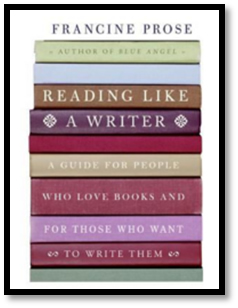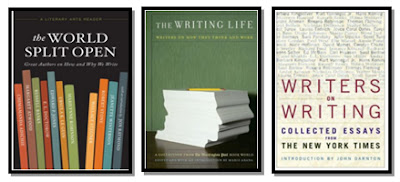So You Want to Be a Writer?
Have you always wanted to write but felt you did not have the time or the know-how to get started? If you have ever considered writing for pleasure, now is a good time to start. November is National Novel Writing Month, familiarly known as NaNoWriMo, so it is an appropriate month to start jotting down your thoughts.
Writing as a means of self-expression can be very satisfying as you take the ordinary and the mundane and create something beautiful, something that is wholly yours. The act of writing can also be therapeutic if you are able to take your doubts or fears and put them down on paper. If you have ever felt angry, upset or hurt, try writing about it. The very act of shaping your emotional experience into prose can transform that experience and make it cathartic. As Karen Bender writes in her essay, "The Accidental Writer", "Giving shape to a painful experience is powerful because it helps us to see ..., how we got through it; .... The experience doesn't stay trapped within us, unspoken, curdling - instead, the art of arranging and transforming it reduces the burden."Note 1 Bender, K. (2013, January 27). The Accidental Writer. The New York Times Book Review, p. 27.
If you would like to start writing, but are not sure how to begin, we are here to help you. By "we", of course, I mean the Mercer County Library, which has loads of books designed to inspire and encourage you to fulfill your writerly aspirations. Most of these books fall into two broad categories: how-to guides, full of practical advice and books by writers, describing their craft and hoping to motivate the writer in you. One book that defies the above classification, but is a must-read for any writer, is Reading Like a Writer: A Guide for People Who Love Books and for Those Who Want to Write Them by Francine Prose. (What an apt name for a writer!). Over the years, I have read all of her fiction books so I was curious to read this nonfiction book. It proved to be an immensely enjoyable and edifying read. In this book, Prose posits that we can learn to write well by doing a "close reading" of books by good writers. She explores the writing styles of time-honored writers such as Austen, Eliot, Dickens, Dostoyevsky, and Woolf as well as contemporary authors such as Philip Roth and John le Carre. Inspirational as well as instructional, this behind-the-scenes look at the works of these great writers demonstrates that the craft of writing is a skill that could be honed by practice and good reading skills.
Eloquent, candid, humorous, and insightful, these essays on writing, by writers, in these three books are must-reads for any would-be writer:
Note 1. Bender, K. (2013, January 27). The Accidental Writer. The New York Times Book Review, p. 27.
Writing as a means of self-expression can be very satisfying as you take the ordinary and the mundane and create something beautiful, something that is wholly yours. The act of writing can also be therapeutic if you are able to take your doubts or fears and put them down on paper. If you have ever felt angry, upset or hurt, try writing about it. The very act of shaping your emotional experience into prose can transform that experience and make it cathartic. As Karen Bender writes in her essay, "The Accidental Writer", "Giving shape to a painful experience is powerful because it helps us to see ..., how we got through it; .... The experience doesn't stay trapped within us, unspoken, curdling - instead, the art of arranging and transforming it reduces the burden."Note 1 Bender, K. (2013, January 27). The Accidental Writer. The New York Times Book Review, p. 27.
If you would like to start writing, but are not sure how to begin, we are here to help you. By "we", of course, I mean the Mercer County Library, which has loads of books designed to inspire and encourage you to fulfill your writerly aspirations. Most of these books fall into two broad categories: how-to guides, full of practical advice and books by writers, describing their craft and hoping to motivate the writer in you. One book that defies the above classification, but is a must-read for any writer, is Reading Like a Writer: A Guide for People Who Love Books and for Those Who Want to Write Them by Francine Prose. (What an apt name for a writer!). Over the years, I have read all of her fiction books so I was curious to read this nonfiction book. It proved to be an immensely enjoyable and edifying read. In this book, Prose posits that we can learn to write well by doing a "close reading" of books by good writers. She explores the writing styles of time-honored writers such as Austen, Eliot, Dickens, Dostoyevsky, and Woolf as well as contemporary authors such as Philip Roth and John le Carre. Inspirational as well as instructional, this behind-the-scenes look at the works of these great writers demonstrates that the craft of writing is a skill that could be honed by practice and good reading skills.
Eloquent, candid, humorous, and insightful, these essays on writing, by writers, in these three books are must-reads for any would-be writer:
- The World Split Open: Great Authors on How and Why We Write, is a collection of ten lectures by eminent writers who discuss their own books, share their sources of inspiration and discuss their writing methods.
- The Writing Life: Writers on How They Think and Work: A Collection from The Washington Post Book World is a compilation of essays by writers as disparate as crime novelist George Pelecanos and historian David McCullough. About fifty writers share their insights on being writers: the trials and tribulations as well as the rewards of being a writer.
- Writers on Writing: Collected Essays from The New York Times is an inspirational assortment of essays by writers on the art of writing. More than forty contemporary writers write about their favorite authors, what motivated them to become writers and how they got started.
- Several Short Sentences about Writing by Verlyn Klinkenborg, at first glance, looks like a long poem. Do not be put off by the look. By writing short sentences and omitting everything extraneous, Klinkenorg forces us to pay attention to the importance of writing strong, purposeful sentences. Read this book for the content and it will improve the way you write.
- The Book on Writing: The Ultimate Guide to Writing Well by Paula LaRocque, a writing coach, is a great book for beginning writers of any genre. Organized into three sections, the author offers expert advice on writing well: write short sentences, pay attention to grammar, and avoid jargons and clichés, are just a few of the helpful tips provided in this writing guide.
- The Sound on the Page: Style and Voice in Writing by Ben Yagoda emphasizes the importance of the how over the what. For Yagoda, "style matters" so a good story can be ruined by indifferent storytelling. A helpful book for any aspiring writer trying to develop a distinctive style and voice of one's own.
Note 1. Bender, K. (2013, January 27). The Accidental Writer. The New York Times Book Review, p. 27.
-Rina B.



Comments
Post a Comment